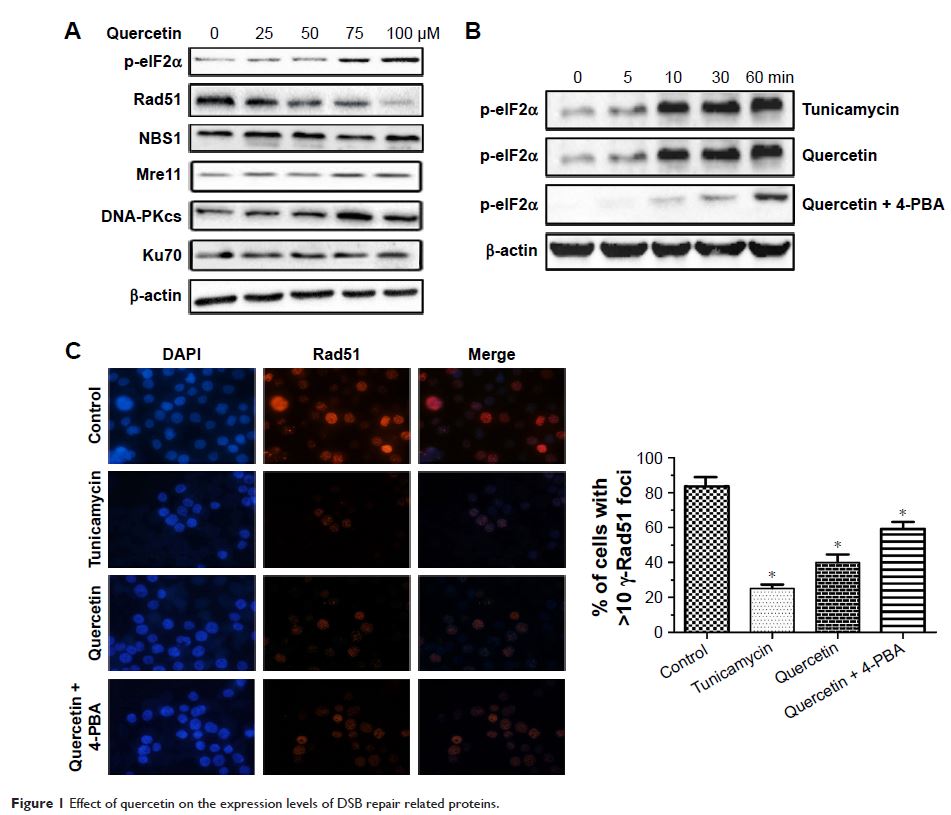108985
论文已发表
注册即可获取德孚的最新动态
IF 收录期刊
- 3.4 Breast Cancer (Dove Med Press)
- 3.2 Clin Epidemiol
- 2.6 Cancer Manag Res
- 2.9 Infect Drug Resist
- 3.7 Clin Interv Aging
- 5.1 Drug Des Dev Ther
- 3.1 Int J Chronic Obstr
- 6.6 Int J Nanomed
- 2.6 Int J Women's Health
- 2.9 Neuropsych Dis Treat
- 2.8 OncoTargets Ther
- 2.0 Patient Prefer Adher
- 2.2 Ther Clin Risk Manag
- 2.5 J Pain Res
- 3.0 Diabet Metab Synd Ob
- 3.2 Psychol Res Behav Ma
- 3.4 Nat Sci Sleep
- 1.8 Pharmgenomics Pers Med
- 2.0 Risk Manag Healthc Policy
- 4.1 J Inflamm Res
- 2.0 Int J Gen Med
- 3.4 J Hepatocell Carcinoma
- 3.0 J Asthma Allergy
- 2.2 Clin Cosmet Investig Dermatol
- 2.4 J Multidiscip Healthc

槲皮素抑制 DNA 双链断裂修复,并通过依赖于 p53 的内质网应激途径增强人卵巢癌细胞的放射敏感性
Authors Gong C, Yang Z, Zhang L, Wang Y, Gong W, Liu Y
Received 26 July 2017
Accepted for publication 14 November 2017
Published 21 December 2017 Volume 2018:11 Pages 17—27
DOI https://doi.org/10.2147/OTT.S147316
Checked for plagiarism Yes
Review by Single-blind
Peer reviewers approved by Dr Amy Norman
Peer reviewer comments 2
Editor who approved publication: Dr Ingrid Espinoza
Abstract: Quercetin is proven to
have anticancer effects for many cancers. However, the role of tumor suppressor
p53 on quercetin’s radiosensitization and regulation of endoplasmic reticulum
(ER) stress response in this process remains obscure. Here, quercetin exposure
resulted in ER stress, prolonged DNA repair, and the expression of p53 protein;
phosphorylation on serine 15 and 20 increased in combination with
X-irradiation. Quercetin pretreatment could potentiate radiation-induced cell
death. The combination of irradiation and quercetin treatment aggravated DNA
damages and caused typical apoptotic cell death; as well the expression of Bax
and p21 elevated and the expression of Bcl-2 decreased. Knocking down of p53
could reverse all the above effects under quercetin in combination with
radiation. In addition, quercetin-induced radiosensitization was through
stimulation of ATM phosphorylation. In human ovarian cancer xenograft model,
combined treatment of quercetin and radiation significantly restrained the
growth of tumors, accompanied with the activation of p53,
CCAAT/enhancer-binding protein homologous protein, and γ-H2AX. Overall, these
results indicated that quercetin acted as a promising radiosensitizer through
p53-dependent ER stress signals.
Keywords: quercetin, p53,
endoplasmic reticulum stress, DNA double-strand breaks, eIF-2α (eukaryotic
initiation factor 2α), ATM kinase
